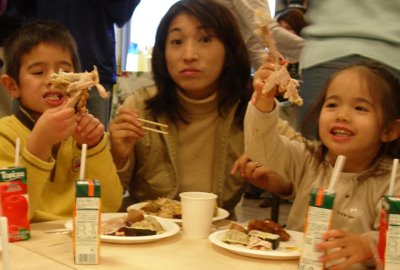As a preschool teacher and parent, I struggle with balancing "study time" and "play time." Of course everyone knows that a big way children learn is through play, and I've long believed that a prepared environment, equipped with appropriate tools, toys and other materials, is as important as my lessons. But recently I've been going even farther and seeing that free outdoor play is an beneficial complement to what goes on in the classroom.
Free Outdoor Play EducatesTwo weeks ago we did a unit on wells and underground water. Since then, the children have been "digging wells" in the park almost every day. They haven't struck water yet, but they have learned several other things.
- Roots are everywhere and extend far out from trees.
- The deeper you dig from the surface, the rockier and more densely packed the dirt gets.
- There are several trade-offs in choosing tools for digging: thick, heavy sticks are more durable but harder to manage than thin light ones; sharp sticks can poke deep but not very wide; the best digging sticks take time to find and prepare but it can be time well spent.
Kids obviously cannot express what they've learned in terms of geology or physics, but that is what they are learning. If we didn't spend time outdoors they would have no idea how hard it really is to dig a well, and they wouldn't have learned other things about tools and what's underground.
"Nature Deficit Disorder"Children these days spend much less time outdoors than even a generation ago. Free time is more likely spent playing a video game than
climbing a tree. Richard Louv, a child advocacy expert has written a book called
Last Child in the Woods: Saving Our Children from Nature-Deficit Disorder
which calls attention to the fact that our plugged-in life has disconnected us from the natural world and leads to real problems like ADD, childhood depression, and obesity. He advocates hiking, swimming, birdwatching, camping and plain-old disorganized, creative outdoor play. (I haven't read the book yet, but plan too soon!)
A lot of bytes have been posted online about the need for children to spend more unstructured time outdoors. Please check out:
- this article for a link between exercise in children and prevention of heart trouble,
- this article about the therapeutic effect of outdoor play on children with ADHD,
- this cover story from Time Magazine about the risks of being too wired for our own good,
- this site about the developmental benefits of play on children,
- this article extolling the virtues of school recess and outdoor play (pdf),
- and not one, but two, excellent blogs from the National Wildlife Federation dealing with the "Green Hour" (an hour a day for children to play outside).
Now, I need to go to bed so I can get up early and go for a walk outside before work!





















